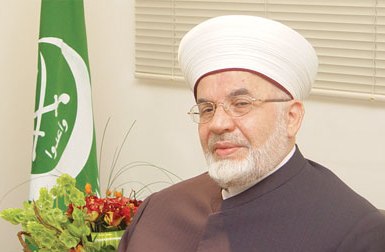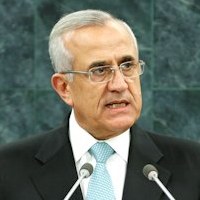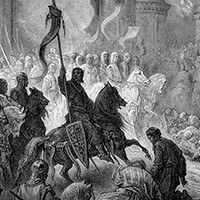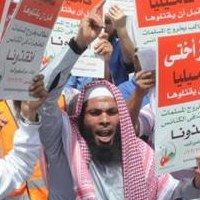![]()
January 2012
This study updates and supplements the ITIC’s June 2011 study of the Muslim Brotherhood. It examines the Muslim Brotherhood in Egypt and other Arab countries in the wake of the past year’s regional uprisings. It deals with the nature of the movement in each country, its relations with the various regimes and evaluates its chances of exploiting regional unrest to its own ends. It also examines the Muslim Brotherhood’s branches in Western European countries and the implications of its activity for both internal European affairs and the Palestinian-Israeli conflict.

The Muslim Brotherhood was represented in Lebanon by Shaykh Faysal al-Mawlawi, who passed away on Sunday, May 08, 2011.
In Lebanon the Muslim Brotherhood works through Al-Jama’ah al-Islamiyya, an organization established in 1964. It has symbolic representation (one deputy) in the Lebanese parliament and has no real influence on Lebanese politics.
Within Lebanon, the organization faces tension between its radical Islamic identity on the one hand and its Sunni and national Lebanese identity on the other. Thus it has relations with Hezbollah — a Shi’ite organization — mostly on Islamic and social (rather than military) issues, but it is also well-coordinated with pragmatic elements of the March 14 camp (led by former Prime Minister Saad Hariri, who enjoys considerable support within the Sunni population). The Hezbollah-led violence inside Lebanon in May 2008, as well as the government’s decision to dismantle Hezbollah’s telecommunications network, escalated the tensions between Al-Jama’ah al-Islamiyya and Hezbollah.
With regard to Israel, the organization rejects negotiations and supports in principle for the “resistance” (i.e., Hezbollah’s path of violence and terrorism). Specifically, the organization raises funds and public support for the Palestinians, usually avoiding direct participation in military activity against Israel. In the first Lebanon war (1982) it collaborated with Palestinian organizations and Hezbollah in fighting against Israel, and even carried out shooting attacks against IDF and South Lebanon Army outposts. In the second Lebanon war (2006) some of the organization’s members joined Hezbollah forces, although they had no impact on the fighting.
The Muslim Brotherhood’s Attitude towards Hezbollah
The Muslim Brotherhood’s attitude towards Hezbollah is influenced by the tension between their shared animosity towards Israel and the wide rift between radical Shi’ite Islam and radical Sunni Islam. Another factor is that Mubarak’s regime was hostile to Hezbollah, considering it a subversive Iranian proxy, making it even more difficult for the Muslim Brotherhood to develop ties with Hezbollah.
During the second Lebanon war (2006) former General Guide Mehdi Akef said that he was willing to send 10,000 fighters to help Hezbollah. No fighters were sent. Starting in 2007, as the Egyptian regime stepped up its efforts against Hezbollah, the Muslim Brotherhood leadership did not demonstrate support for Hezbollah, fearing the reaction of the regime. The exposure of the Hezbollah cell in Egypt in 2008-2009 was another example of the movement’s ambivalence towards Hezbollah: while former General Guide Mehdi Akef repeatedly expressed sympathy for Hezbollah, the movement’s representatives in the Egyptian parliament parroted the local national discourse and the government’s policy, condemning the violation of Egypt’s sovereignty: they expressed support of the so-called “resistance,” but not at the expense of Egypt’s national security.
![]()
Read the other sections here:
1. The Muslim Brotherhood in the Arab World and Islamic Communities in Western Europe: an overview
2. The Muslim Brotherhood in Egypt
3. The Muslim Brotherhood in Syria
4. The Muslim Brotherhood in Jordan
5. The Muslim Brotherhood in Algeria
6. The Muslim Brotherhood in Sudan
7. The Muslim Brotherhood in Saudi Arabia
8. The Muslim Brotherhood in The United Arab Emirates
9. The Muslim Brotherhood in Lebanon
10. The Muslim Brotherhood in Morocco
11. The Muslim Brotherhood in Tunisia
12. The Muslim Brotherhood in Europe



 RSS
RSS










Latest Comments
Hello Mike, Thank you for your positive feedback to the article. I felt there wasn’t too much critical analysis of ...
Thanks for this considered and well constructed article. A follow up article on the manner in which the editorial contro...
THE CLUELESSNESS OF CLAIMING THAT OBAMA'S MIDDLE EAST POLICIES WERE A FAILURE CANNOT BE FURTHER FROM THE TRUTH, WHAT THE...
As long as Obama is the president of the usa do not trust the us government......
Thank you for an good read....